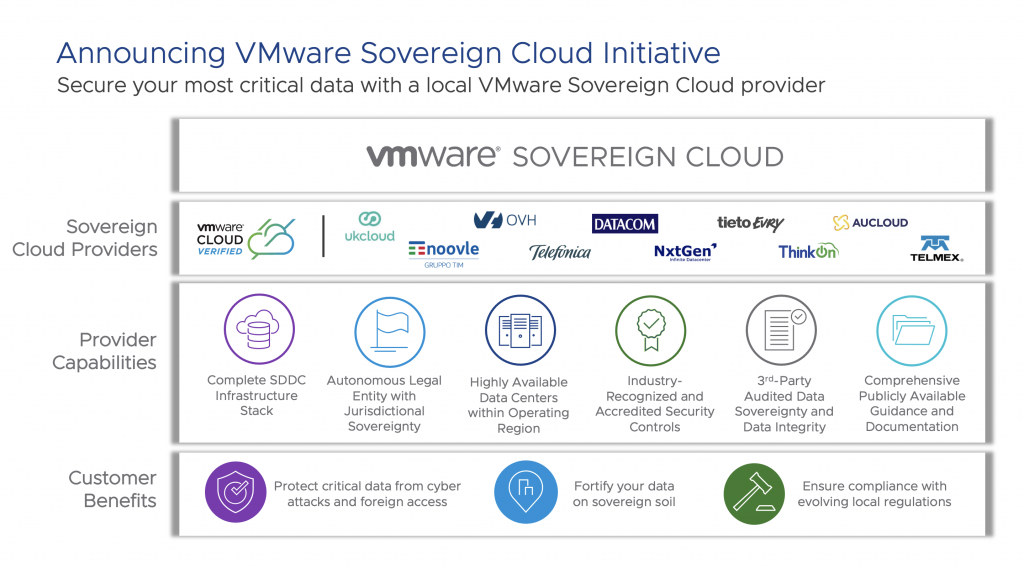- The iPad Mini is 20% off, making my favorite portable tablet even easier to recommend
- Best Buy is giving away $300 gift cards when you buy a Hisense TV - here's how to qualify
- How to uninstall the iOS 26 beta on your iPhone (and why you might want to)
- AI agents will be ambient, but not autonomous - what that means for us
- I replaced my premium headphones with this classic Bose pair - and didn't regret it
Announcing the New VMware Sovereign Cloud Initiative – VMware Cloud

Focus on social and governance values, rising political challenges, cyber security threats, data protection, data portability and data control are all among key reasons why customers are looking to sovereign cloud providers. The EU is striving forward with the Gaia-X initiative that aims to create an interoperable data exchange among a unified ecosystem of sovereign cloud and data services, facilitating safe data exchange for businesses protected under EU legislation and valued principles such as openness, transparency, data protection, security, and portability.
Sovereignty has become an important part of national policy, essentially the contract between state and citizen, protection in return for law acceptance. National policy has changed considerably under the digital era, and likewise the contract of sovereignty is rapidly evolving as threats come from anywhere and the boundaries of protection must adapt to digital.
When you look at the environment, companies and nations face many social and governance challenges today. It is easy to see where cloud sovereignty can help promote social values, care for the environment and build the new digital borders. In an age where digital giants can upend established markets, it is of growing importance that nations look back at their own capabilities and assess how to protect their economies and grow sustainably.
Sovereign cloud Environment, Social & Governance (ESG) strategies align to VMware EPIC2 values, especially community, where VMware Sovereign Cloud providers aim to give back to the community to assist in national growth and development, and also hire in-country resources to work on national clouds.
In line with ESG, VMware’s virtualization software has made a huge impact on the environment, a 2020 IDC report estimated that, since 2003, VMware’s virtualization technology has enabled our customers to collectively avoid the deployment of 142 million servers, consumption of 2.4 billion megawatts of energy, and emission of 1.2 billion metric tons of greenhouse gases. That’s a huge environment saving covering the “E” in ESG.
VMware’s Sovereign Cloud initiative is a global collection of cloud provider partners who are addressing the ESG values in many ways, but particularly the “G” for Governance with their approach to sovereignty.
Sovereign cloud providers are committed to ensuring data privacy and compliance, helping customers get the benefits of cloud whilst also meeting the rapidly growing and changing data privacy laws. These national or regional regulations and laws govern everything from where data resides geographically to cross-border data flow. Moreover, organizations need to protect data in the cloud against evolving cyberattacks. Sovereign cloud providers ensure that data sovereignty, data residency, data access, jurisdiction, control, and much more are met with the assurance that customer’s most sensitive data is managed securely.
Sovereign clouds hence don’t just appeal to public sector businesses, also virtually all enterprise across all verticals. However, there is a significant benefit to customers in regulated industries, such as; the banking and financial sector, healthcare, local retail and ecommerce, energy, government services, defense, intelligence and regional telecom. Partners can obtain compliance for customers with local and vertical-specific regulations in their appropriate jurisdiction through the constructs of sovereign clouds. On the other hand, customers have the assurance that their privacy is maintained, and their data is stored, secured, and protected in their specific jurisdiction.
Partners that offer a sovereign cloud can accelerate the growth of their national businesses and further develop a national capability for digital infrastructure and resilience. Sovereign states need a digital capability that prevents them from becoming dependent or acquiescent on foreign powers and operators for processing their own data.
VMware Sovereign Cloud partners deliver Cloud Verified services and utilize architecture built on VMware Validated Designs (VVD) for Cloud Providers, this means they can design, architect and secure compliant clouds faster and efficiently. Being Cloud Verified means that they can deliver scaled multi-tenant hybrid cloud environments whilst maintaining security, access and control, essential underpinning for a sovereign cloud. However, there is a lot more to sovereign clouds than the technology being used in the cloud. VMware Sovereign Cloud providers must self-attest to a framework of guiding principles, best practices, and technical architecture requirements to deliver cloud services that adhere to the data sovereignty requirements of the specific jurisdiction in which that cloud operates (as mandated by the relevant government or commercial body). VMware Cloud Providers that meet this framework can be invited to join the initiative.

VMware is recognizing the value that these partners bring, delivering sovereign cloud, and has established a specific designation with them so that customers looking for sovereign services can find a relevant partner faster. Through the VMware Sovereign Cloud initiative, VMware will connect customers with VMware Sovereign Cloud providers to achieve the scale and constant security to manage their most critical data. VMware will assist VMware Sovereign Cloud Providers with technical guidance and best practices to design, build, and operate a sovereign cloud and extend their offering portfolios to include more advanced data services for their customers.
Find out more about VMware Sovereign Cloud initiative on the website or at the VMworld 2021 session.

